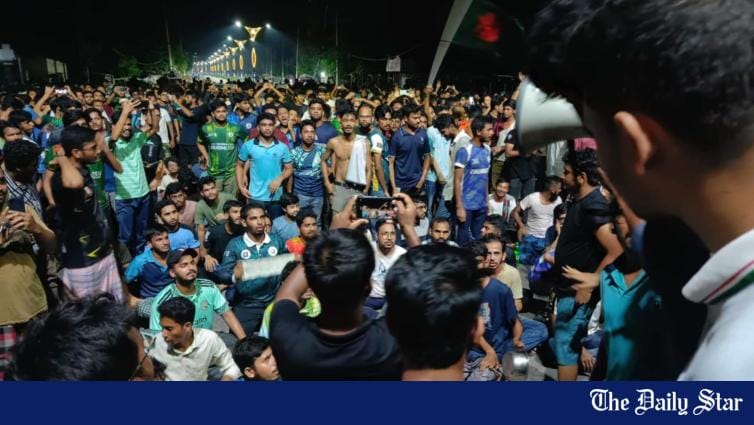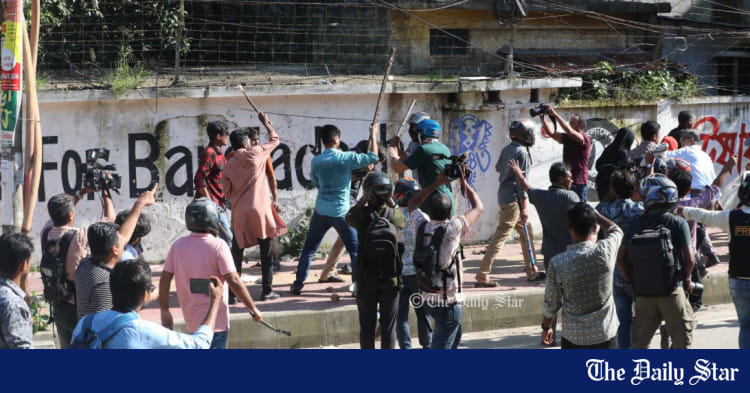It's time to say 'no' to discriminatory quota
Habib Siddiqui 13 July, 2024, 22:59
Protests against quota in public service recruitment. | New Age/Md Saurav
IN RECENT days, Bangladesh has seen student protests in many parts of the country, especially on university campuses. The protesting students have valid reasons to protest about a quota system that they find highly unfair and discriminatory. A whopping 30 per cent of the well-paid and massively oversubscribed Bangladesh Civil Service posts are reserved for the family members of those who fought during the liberation war of 1971, and another 10 per cent for women, 10 per cent for districts, 5 per cent for ethnic minorities and 1 per cent for the disabled and handicapped. This leaves only 44 per cent of the jobs reserved for merit for roughly 98 per cent of the applicants.
Critics of the quota system say the system benefits children of pro-government groups that back prime minister Sheikh Hasina. They allege that the system incentivizes and weaponizes 'party politics' in the government sector. Critics also accuse Bangladeshi courts of rubber-stamping decisions made by the Awami League government.
Supporters of the quota system, on the other hand, say the system is necessary to promote and sustain a pro-liberation mindset and behaviour. They see it also as a pay-off for the sacrifice and contribution of freedom fighters and as a necessary means of promoting diversity and secularism in Bangladesh.
Interestingly, not all the freedom fighters favour the quota system any longer. Many of them say that it has outrun its utility half a century after the liberation of Bangladesh. Some see it as an insult to their very patriotism. They say that they did not participate in the war with the intention of getting rewarded or that one day their posterity would benefit from and take advantage of their service to the nation. As true patriots of the country, they like to see the discriminatory quota system gone, thus enabling a merit-based recruitment process to take root in the government job sector.
The other pertinent fact in this debate is that the list of freedom fighters was completed only in 1996, some 25 years after the liberation of the country. As a result, although the 30 per cent quota for the FFs was first introduced back in 1972, many freedom fighters could not avail themselves of the benefits when it was necessary. In 1997, as the numbers of those claiming FF quota positions started to dwindle, the government extended the quota to the children of freedom fighters. In 2010, it was further expanded to include the grandchildren of freedom fighters. According to the minister for liberation war affairs, Muzammel Haque, only about 5 per cent of the applicants in the last five BCS exams had come from FF families, of which about half passed the written test. Thus, according to him, in most cases, the 30 per cent quota was hardly ever filled to its specified figures.
What needs to happen with a system that is seen so negatively by so many inside Bangladesh?
To be sure, there were no more than 200,000 freedom fighters in 1971 whose family members can't add up to more than a small percentage of the overall population today. And so is the case with ethnic minorities. It is not difficult to understand why the protesters are so upset with the quota system, which they find unfair and discriminatory. It is disheartening for most graduating students, who see a bleak future awaiting them after years of college or university education. It is, at minimum, an issue of livelihood for many youngsters inside Bangladesh who face an acute job crisis. While Bangladesh has made much progress economically under Sheikh Hasina's watch, with per capita income overtaking India in 2021, the sad fact is that much of that growth has come from the readymade garment sector, which absorbs only a handful of university graduates and not any other industrial and commercial sector requiring huge, educated manpower.
As I had noted in an earlier article, the government of Sheikh Hasina has been well aware of the quota problem for quite some time. Back in 2018, after weeks of protests, her government cancelled the 56 per cent quota for the civil service for the first- and second-class jobs (while keeping the 56 per cent quota intact for the 3rd and 4th grades). Sadly, on June 5, 2024, following a writ petition filed by the descendant of a freedom fighter and six others, the High Court in Dhaka declared the government decision illegal, sparking protests again from the student community and job seekers. Students launched protests earlier this month with a four-point demand, including the reinstatement of the 2018 government circular. They blocked major highways and railway lines.
Prime minister Sheikh Hasina condemned the student protests, saying the matter had been settled by the court. 'Students are wasting their time,' Sheikh Hasina told female activists within her own party on July 7 before her official visit to China, adding there was 'no justification for the anti-quota movement.'
The protesting students and job seekers obviously don't agree with her statement and would like to see a permanent solution to the discriminatory quota system. They say that they are, however, not opposed to five or so per cent of jobs being reserved for ethnic minorities and disabled or handicapped people. They have vowed to continue their protests, the so-called 'Bangla Blockade' programme, until their latest 'one-point' demand — for a law passed in parliament that outlaws the discriminatory quota system — is met. This time, they have also chosen the Supreme Court to file their grievances.
Based on a petition filed on July 10 by two Dhaka University students challenging the High Court verdict, Bangladesh's top court has temporarily suspended quotas for coveted government jobs. Apparently, such a temporary measure is not acceptable to the protesters. After a one-day break in their programme, student organisers announced a nationwide blockade on July 11. Many teachers have also joined in these protests, forcing the academic activities of many universities to come to a complete halt.
As we have seen in the past, these protests are seen by the ruling Awami League as anti-government agitations that are being encouraged by the opposition, especially the BNP. Minister Obaidul Quader said, 'If anyone tries to give the protests a political shape, we'll face it politically.' The home minister also threatened to use force to curb any violence.
At Comilla University, police chased students and opened fire, while in Chittagong, they used batons against protesters. Amnesty International expressed concern over reports that at least 20 people, including students, were injured in the police crackdown. Tear gas was used by the police on the protesters in various cities, resulting in some injuries and further worsening the situation. The organisers are seemingly determined to continue their protests until their legitimate one-point demand is met.
Experts have long spoken of the adverse effects of a discriminatory quota system that may not allow the best candidates to be selected for government jobs. In the corporate world, there is a saying: the 1's hire the 1's empowering them; the 3's hire the 5's to create a cadre of sycophants who won't challenge them; and when the 5's are in power, it is not why but when that corporation is gone. What is true in the corporate world is more true for a state, especially in the age of the Internet, where there is no room for mediocrity. Simply put, mediocre minds do not and cannot think brilliantly, and they hire and promote poorly so as not to be challenged. This puts the state on the wrong trajectory. To survive in a fast-paced and highly competitive global economy, it needs talented workforce planning and executing various programmes effectively.
If the Hasina government is serious about positioning Bangladesh successfully in the global arena, it needs to promote meritocracy. Nor should it be oblivious to the old saying that the politics of Bengal is in reality the economics of Bengal.
Dr Habib Siddiqui is a peace and rights activist.








 www.newagebd.net
www.newagebd.net












 www.newagebd.net
www.newagebd.net
